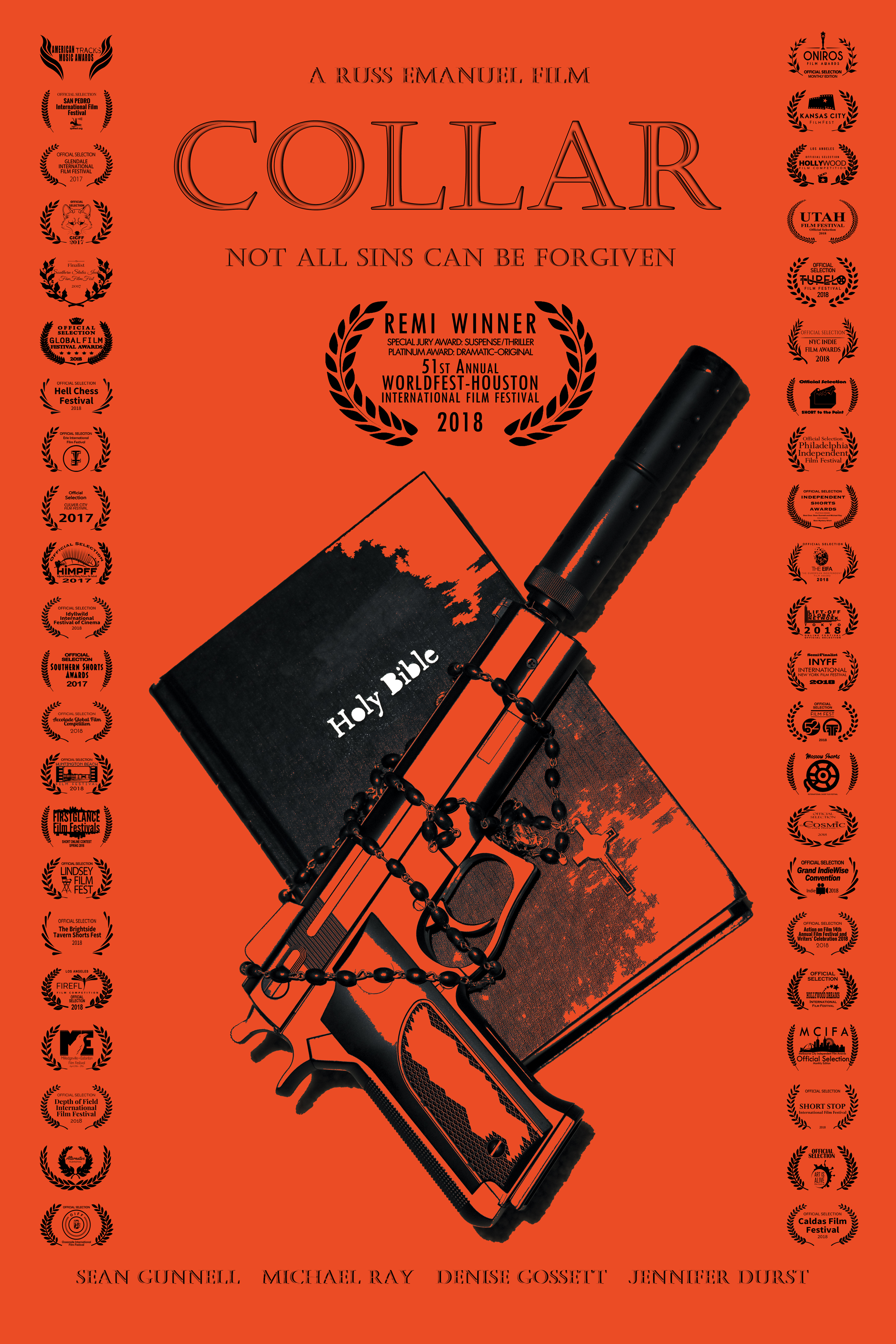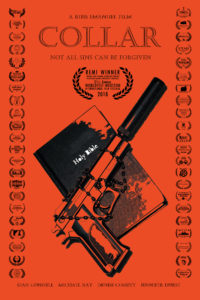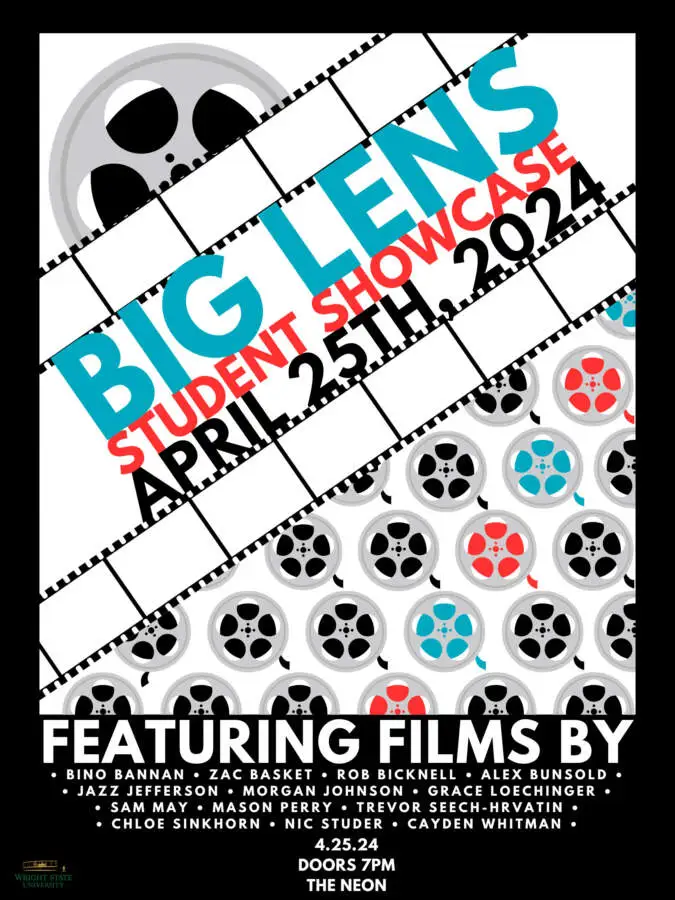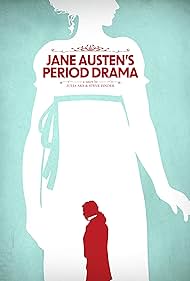
Short Film Review “Collar”
WATCH THE TRAILER HERE
First, the Recap:
The serenity of an idyllic day. To be out in a park, perhaps, enjoying the simple peace of letting the sun shine on you, listening to the varied noises of humanity and nature passing by, comforted by a beautiful light breeze. It is the perfect day. At least, that’s what you thought it would be. Starting out to be such a scenario, a local priest named Father Harris (Michael Ray) settles against the park bench, taking in all of creation, clutching his beloved Bible, and resting in God’s grace. Thinking all is well, events begin to take a different turn when there appears in his place of solitude a tall man (Sean Gunnell), who promptly takes a seat.
The ensuing discussion, which is initiated pleasantly enough, soon begins to veer towards hostile as the man confronts Father Harris about faith, the existence of God, and related notions that the pious priest deeply abides and confides in. Vehemently denying the concepts being put forth by the minister about God and his heartfelt convictions, the man then very unexpectedly goes on the offensive even harder, as direct and overtly disturbing accusations are leveled towards Father Harris, whose demeanor devolves into one of avoidance and attempted refutations, all leading to an harrowing and uncertain outcome.
Next, my Mind:
An exercise in calmness turned into chaos wrapped in a sobering and highly potent lesson that reveals how secrets can be exposed, this quick-paced, 15-minute indie short film drama from director/producer Russell Emanuel and writer/producer Troy Gabaldon certainly wastes no time exploring its themes of religion, faith vs. doubt, devastating truths, dark inclinations, and the smooth veneer that tries to mask it all from the world–and from ourselves. The narrative’s in-your-face execution only aids in helping the film’s intentions be made that much clearer, and a situation that starts so harmlessly slowly devolves into a continual, tension-filled, inflammatory tirade against a seemingly innocent priest, making the viewer feel sorry for him.
Yet, as the events unfold, we begin to question both men, their motives, and their true natures, all leading up to one effective, gut-punch of a finale that puts a serious exclamation point on everything we’ve witnessed while again painting that unsettling picture of human nature and how we so often tend to try everything we can to hide faults away, no matter how small or large, thinking that there’s no way they will ever be laid bare outside of our own choosing or timing. Additionally, it also illustrates how much we seem to purposefully shift focus onto other people’s failings, even if said shortcomings might actually need to be dealt with, in order to cover our own frailties while deciding to pass judgement as well. The film does an excellent job at presenting all of this both visually and via the dialogue, perhaps almost too well as it just might remind us of how we too have acted as such towards others while keeping skeletons in the closet, even if not quite to this extreme here.
Ray does one remarkable job in his performance as Father Harris, a parish priest whose whole idea on this day was to relax, read the Bible, be free from worries, and find a little solace in his surroundings and his faith. While having these humble beginnings, watching as the tranquility gets upended by the arrival of Father Harris’ uninvited “guest”, who proceeds to berate everything and ultimately become the good father’s judge and jury, is unnerving and abrupt in its intensity and effect, causing an inward-facing self assessment that shines a harsh light on bitter realities. Throughout, Ray embodies this radical shift in behavior and subsequent emotional upheaval with a believable drive and urgency that does justice to the character and his plight.
Likewise, Gunnell delivers the goods with a deliberate fierceness as the tall man, a stranger in shades and a baseball cap who initially seems like any random passerby deciding to sit down and chat with a fellow person–until his attitude towards the priest begins to sour. At first, though, even the negativity towards the priest’s notions on God, religion, and the like are relatively common from those who don’t favor any of it. It’s only when things get far more personal and the barbed, more specific verbal attacks against Father Harris begin that we realize this man might also not be what he seems on the surface. The escalation of the proceedings is filled with menace and malice, lies and actuality, with both men’s lives forever altered, and Gunnell absolutely soars as this spiteful antagonist.
Supporting appearances are made here by Denise Gossett as one of Father Harris’ parishioners Mrs. Lawson, who happens on the scene briefly as the two men are in the heat of conversation, and Jennifer Durst as a confessional occupant named Beatrice. Other turns are present from Julia Camara, Michael Candelet, Emilia Aldridge, Cheryl Calise, and Lane Smith. In total, with its no-holds-barred thematic elements, grounded enactment, and disquieting air, “Collar” is a more than worthy short film effort to entertain while also causing us to take a look at what’s real, what’s true, recognizing that no one’s perfect, but that certain actions do have potentially dire consequence.
As always, this is all for your consideration and comment. Until next time, thank you for reading!




